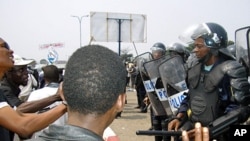A new report directed by the U.S.-based Eastern Congo Initiative is calling for more political will inside the Democratic Republic of Congo and more help from outside to effectively reform the country's security sector, after years of failure. The report is called "Taking a Stand on Security Sector Reform."
More than a decade after the official end of Congo's war, an estimated 1.7 million people remain displaced internally because of ongoing violence, mostly in the east of the country, while about half a million Congolese remain refugees in neighboring countries.
In eastern regions, gender-based violence and rape, the recruitment of child soldiers, militia and rebel activity, illegal mining and cross-border smuggling remain rampant. The most recent election cycle was marred by violence across the country.
Despite large quantities of highly sought minerals used to make cell phones and laptops, the Democratic Republic of Congo remains 187th out of 187 countries on the United Nations Human Development Index.
A report released this week by the Eastern Congo Initiative and other groups, including Congolese civil society forums, says the main problem is Congo's security sector, which remains much more of a scourge than a help.
A conference in Washington Monday started with the release of a video by the founder of the Eastern Congo Initiative, American actor Ben Affleck.
"Armed groups continue to prey on Congolese families and their communities. Perhaps most troubling, they are not the sole violators of human rights," said Affleck. "The police, judiciary and most importantly the military are all too often perpetrators rather than protectors. As a result, people suffer, investors are put off, the unemployed turn to militias to secure a living, and the cycle of violence continues."
The first speaker was Cindy McCain, wife of U.S. Senator John McCain. She has made several recent trips to Congo and joined forces with Affleck in terms of Congolese advocacy. She also underlined the urgency of security sector reform.
"An effective security sector, organized, resourced and trained, is essential to solving problems from displacement, recruitment of child soldiers, and gender-based violence," she said.
The report calls on Congolese civil society to take charge of the issue, while demanding Congo's government carry out repeated promises of security sector reform with clear benchmarks. It calls for a more unified structure and command of Congo's military, with more recruitment of women and underrepresented social groups, while ending the integration of militias.
The report says too little money, both channeled by Congo's government and coming from outside, is directed toward these types of reforms. It says donors, who contribute about half of Congo's budget, have had poor coordination on the matter.
One of those acknowledging the many challenges, despite continued attention to the problem, is U.S. State Department official Karl Wycoff.
"We recognize that the DRC has struggled to make meaningful progress in the implementation of security sector reforms and has had little success holding security forces accountable for their human rights violations," said Wycoff.
He also says the Congolese government has failed in its many attempts to integrate former rebel fighters into the army.
Several Congolese audience members were angry the report focuses too much on eastern Congo and not on the entire country. They also say the real problem is a lack of democracy and failed elections, which have twice returned President Joseph Kabila to power, since he took over after the 2001 assassination of his father, former coup leader Laurent Desire Kabila.
Albert Moleka is a spokesman for Etienne Tshisekedi, the current president's main political rival. Moleka says he believes if the Democratic Republic of Congo had properly elected leadership, the country would not need outside help to reform its military. Moleka says he was not impressed by current security reform efforts, which already include the United States, other governments and the United Nations.
A Congolese embassy spokesman, Yves Bashonga, denied there is a lack of political will with the current government in Kinshasa, but rather problems in how fast the reform is going and whether the right strategies are being employed.
News
Report: Congo's Security Sector Reform is Vital




